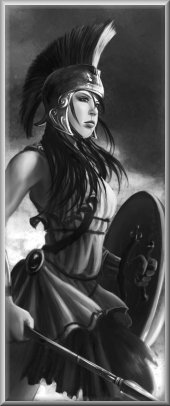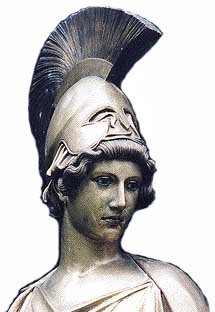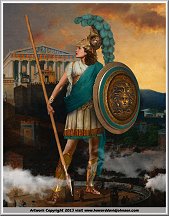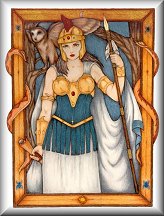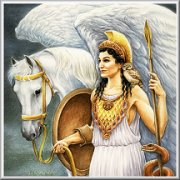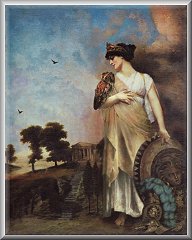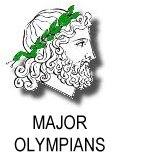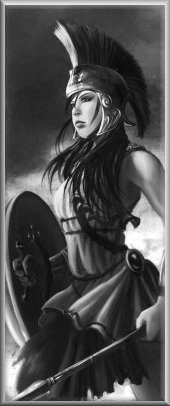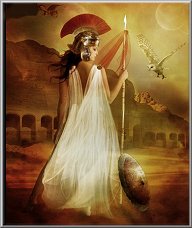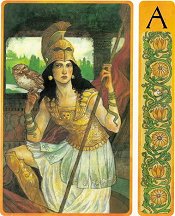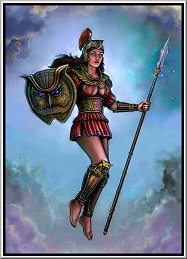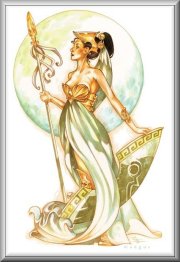MYTH MAN'S AWARD-WINNING HOMEWORK HELP
MIGHTY ATHENA, GODDESS OF WISDOM
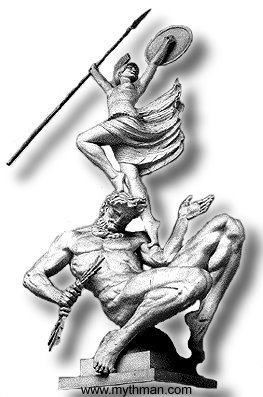
LATIN - MINERVA
PALLAS ATHENA
Athena remains one of the most fascinating and influential deities
of all the Olympian gods and goddesses.
The great Athena was the first to teach the science
of numbers and all ancient women's arts, such as cooking, weaving and
spinning. She was the goddess of wisdom and war, but, unlike the god of
war Ares, she took no pleasure from battle, preferring instead to settle
conflict through mediation.
But that's not to say she wasn't one tough goddess!
Her mercy was great and if ever it came to her to cast a deciding vote
in a criminal trial, she usually chose to liberate the accused. But
don't mess with Athena!
When Athena was moved to engage in battle she never
lost, even against Ares himself, for she was a far superior strategist
and tactician than he; generals and wise captains always approach her
for advice. She bears no arms in times of peace and will usually borrow
weapons from Zeus when needed. She alone was permitted to use his
fearsome Aegis, and his devastating thunderbolts.
It's suggested in the Palasgian myths that Athena was
born beside Lake Tritonis in Lybia, and her father has been variously
identified as Poseidon, Itonus or Zeus, king of the Olympian gods.
The most widely accepted version holds that Athena is
Zeus’ daughter and his favorite child, and she is often described as
"gray-eyed" or "flashing-eyed." In popular myth, and in accounts related
by her own priests, she is said to have no mother, because she sprang
full grown and in full armor from her father's head.
This is not entirely true however. Athena’s mother
was Metis; Zeus came to lust after her, and wasted no time in pursuing
her in his direct way. Metis wanted nothing to do with Zeus and tried to
escape as best she could, going so far as to change her form many times,
turning into various creatures such as hawks, fish, and serpents. But
Zeus was both determined and equally proficient at changing form.
Refusing to be denied he continued his pursuit until she relented.
An Oracle of Gaea (Mother Earth) then prophesied that
Metis' first child would be a girl, but her second child would be a boy
that would overthrow Zeus as had happened to his father (Cronus) and his
grandfather (Uranus). Zeus took this warning to heart. When he next saw
Metis he flattered her and put her at her ease, then with Metis off
guard Zeus suddenly opened his mouth and swallowed her. This was the end
of Metis but, possibly the beginning of Zeus's wisdom, for many claim
that Zeus really had no brains until he swallowed his wife.
After a time Zeus developed the mother of all
headaches. He howled so loudly it could be heard throughout the earth.
The other gods came to see what the problem was. Hermes realized what
needed to be done and directed the smiths god, Hephaestus, to take an
axe and split open Zeus's skull. Other sources claim that it was the
Titan Prometheus who rendered the blow. Out of the skull sprang Athena,
full grown and in a full set of armor. The very ancient Greeks believed
that men were solely responsible for conception of a child, and the
woman’s only role was to carry it until it was born, that's why Metis is
not given any credit for Athena's birth.
There are two distinctly different representations of
Athena’s character. In the classic story of the Trojan War, theIliad,
by the poet Homer, she is a fierce and ruthless warrior goddess, who
takes pleasure in war and fighting. In the Odyssey and all alter poetry
she is still very powerful, but only fights to defend the State. She was
the embodiment of wisdom, purity and reason, as well as the patron of
the handicrafts and sciences and agriculture.
Her contributions to society were manifold: She gave
mortals the bridle allowing them to tame and use Poseidon’s gift,
horses. She also invented the trumpet, the flute, the pot, the rake, the
plow, the yoke, the ship, and the chariot. Of the three virgin goddesses
(Athena, Artemis and Hestia) she was chief and called the Maiden,
Parthenos. To honor her the ancient Greeks built at Athens a splendid
temple called the Acropolis, with its centerpiece consisting of a temple
to Athena called the Parthenon.
Indeed Athena was a brave warrior and she was the
lone deity to stand her ground when Typhon attacked Olympus. Typhon was
the largest, most dangerous, and most grotesque of all creatures. So
frightening and intimidating was Typhon that when he rushed Mount
Olympus all of the gods ran off to Egypt and hid themselves by assuming
the forms of various animals.
Only Athena stood firm, and she shamed and goaded
Zeus into action. Zeus struck Typhon with a thunderbolt and used Uranus'
castrating sickle to wound the enormous creature. Typhon retreated to
Mount Casius, where he and Zeus resumed their struggle, hurling
mountains at one another, which resulted in Typhon being crushed beneath
what is now known as Mount Aetna.
Mount Olympus and the reign of Zeus was saved thanks
to Athena.
Athena railed against excesses in war or everyday
life. She taught men to conquer their savage streak, to tame nature and
become masters of the elements. Her adoring subjects called her "Queen
of Heaven", the meaning of "Athena".
Even though she was as modest as Artemis and Hestia,
the other virgin goddesses, Athena was far more generous. A man called
Teiresias chanced upon Athena while she was taking a bath and she was
startled to realize that he had entered the room and seen her. Not
wanting to kill Teiresias for his folly, she laid her hands over his
eyes and blinded him, but gave him inward sight so that Teiresias became
one of the most well-known oracles in Greece.
One of the few times that Athena showed petulance was
in her weaving contest against the mortal named Arachne. This young
woman fancied herself the world's best weaver, even daring to compare
herself favorably against Athena. Hearing this impudence, Athena took on
the guise of an old woman and appeared at Arachne's house to give her
some friendly advice to respect the gods. Arachne was too vain to listen
and told the old woman to be gone.
"Let the great Athena try her skill against mine, and
if I lose she can do whatever she pleases with me," she boasted. That's
when Athena dropped her disguise and revealed her true identity. All the
bystanders fell to their knees in reverence except for Arachne, who was
unmoved.
The two began their weaving contest, and for a while
Arachne held her own against Athena, even poking fun at the gods through
the tapestry she crafted, but finally Athena had enough and touched the
impudent mortal on the forehead, making her feel her shame. Aghast at
the realization of her vanity, Arachne ran off and hung herself from a
tree.
Feeling sorry for the hanging Arachne, Athena brought
her back to life, but so that mortals learn that it doesn't pay to
compare themselves to the gods, she changed Arachne into a spider. There
she sits, her and her descendents, forever weaving their web, testament
to the folly of vanity.
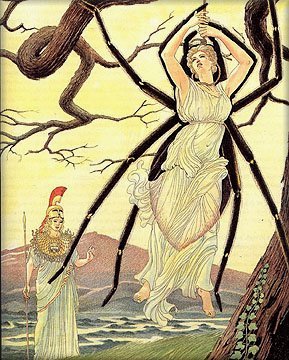
RECOGNIZABLE GODDESS
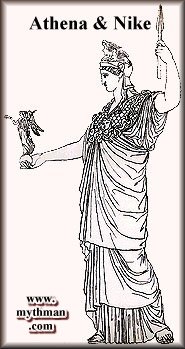
[HOME] [MYTHOLOGY'S
EFFECTS ON MODERN SOCIETY][OLYMPIANS]
[GALLERY] [MAJOR
GODS] [MINOR
GODS] [HEROES]
[CONTACT]
[LOVE STORIES]
[MYTH OF THE
MONTH] [FUN
STUFF] [CREATURES]
